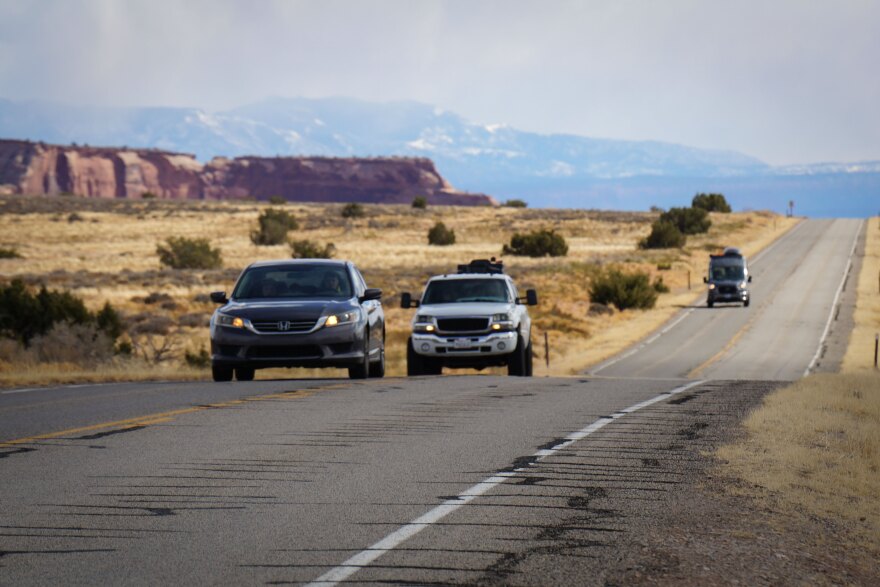Around this time last year, Kaysville resident Payson Wagstaff was heading home from work on I-15. As he made the drive from Salt Lake City, he noticed a piece of cement in the middle of the lane. Wagstaff was in the far right lane with construction equipment to his right and a vehicle to his left, so he made the split-second decision to hit the cement head on.
“It was a pretty large piece,” he said. “Large enough so that when it hit my bumper, made a pretty loud sound, ended up putting a hole in my bumper, scraping off a ton of paint, and then as it traveled underneath my vehicle, it also tore the under panel in my vehicle off.”
Wagstaff said he paid $700 out of pocket to fix his car himself. He had to replace his foglight and undercarriage and paid for his car to be repainted.
It’s not the only time he’s run into road debris.
A year earlier on a dark autumn night, which Wagstaff said limited his vision, he hit a piece of tire in the middle of the lane.
“I had people next to me, and I wasn't able to veer out of the way, and it tore out the wheel well in my car,” he said.
He paid $75 to replace the plastic covering in the wheel well himself.
“I think that was really what was the thing that I was most frustrated about,” he said.
Unsecured loads and road debris cause, on average, around 753 crashes in the state each year, according to a Utah Department of Public Safety fact sheet. In the last five years, crashes involving road debris have also led to 18 fatalities.
Utah Highway Patrol officers respond to more than 70 calls per day involving road debris, or more than 25,000 a year.
When a piece of debris needs to be cleared off a highway or interstate, highway troopers respond to the scene and create a traffic slowdown.
“When you see troopers out there weaving back and forth with their lights on and sirens on trying to get traffic to slow down, they're trying to create a break in traffic, where it's safe for an officer to go out in the road, get that debris, whatever's in the roadway, and bring it over to the shoulder where it can be safely picked up by UDOT,” Lt. Cameron Roden, public information officer for UHP, said.
The Utah Department of Public Safety and Department of Transportation work together on cleanup. UDOT has over 80 maintenance stations across the state that work to keep the highways clean.
It isn’t cheap, either. The state spends around $2.9 million per year on road debris cleanup. UDOT’s public relations director John Gleason said they’ve noticed more road litter in recent years.
“We've seen enough out there on the roads to reconstruct an entire living room or kitchen,” he said.
So it’s important to get to the root of the problem, which is making sure people secure their loads.
“If we can all do our part, we'll get there,” he said. “We're all so proud of living in Utah. It's such a beautiful state, and we all want to keep it that way.”
Educating people about how to properly secure loads is a large part of public safety’s efforts to keep roads clean and lower the number of crashes per year.
The Utah Highway Safety Office has several tips for people to make sure loads are secured. Drives should place lighter items under heavier items, which should be tightly secured and fastened to the vehicle with ropes, netting, straps or chains. Adding a tarp or netting over the whole load can lend extra protection as long as it’s tied down. People should also walk around the entire vehicle to make sure the load is secure. Speed, weight and gravity do not make a load safe, and people should be sure not to overload a truck or trailer with extra weight.
Utah Highway Patrol troopers will pull people over if they notice a load is not properly secured.
“If we find us a load that's not properly secured, or a load type spill, there is a citation which we can use for failure to secure a load,” Roden said.
Drivers could face a $200 fine for a first offense, or a $500 fine for a second.
But much of the time, debris ends up on the road before someone is pulled over, which is why it’s important for drivers to stay alert and aware of their surroundings.
Roden said maintaining an appropriate following distance behind vehicles and going the speed limit are two steps drivers can take to avoid collisions with road debris.
“And that's why driving is a full-time job,” Roden said. “That's why we need to make sure that we're not distracted, we're not impaired or anything like that.”
Gleason says road debris should be reported immediately to 911.
“Especially if it's a big enough object that it's going to potentially cause a crash, you want to report that right away,” he said. “Then our UDOT crews can get out there, UHP can get out there, law enforcement, and they'll do a traffic slowdown and get out there and remove the object from the road.”





